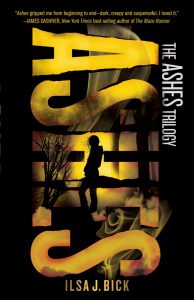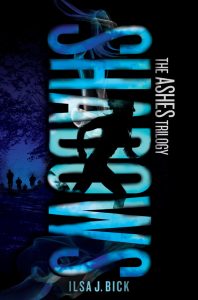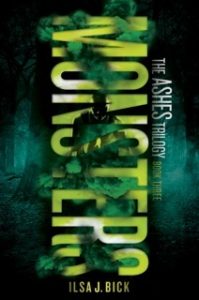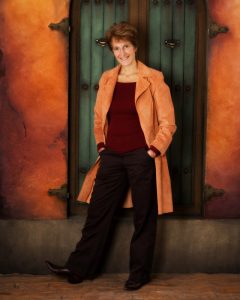BOD Spotlight with Ilsa J. Bick
Post by Angie Taylor
This week I had the amazing privilege of interviewing fellow BOD member and author Ilsa J. Bick. Please enjoy this awesome author spotlight interview!
 Thank you so much, Ilsa, for taking part in our BOD author spotlight interview. I know all our BOD members are so excited to hear from you!
Thank you so much, Ilsa, for taking part in our BOD author spotlight interview. I know all our BOD members are so excited to hear from you!
My pleasure. I love knowing that all those hours spent hunched over a hot keyboard actually means something to someone besides my cats, who really only see me as the Can Opener. But you take what you can get.
You have done so many interesting things in your life, and have had many different careers. When did you know that writing was going to stick?
Gosh, I don’t know. I’d like to say that it snuck up on me gradually. See, as a writer, you start out with small goals—or, at least, I did. First, all I ever wanted was to write nonfiction essays on film and television. Then my husband dared me to write a story; he thought I was afraid to because I might actually like it. So then it was . . . finish a damn story. Then it became publish a story. Then, it was a couple stories, and then that morphed into what was my biggest goal: to write a Star Trek book.
Hey, you think I’m kidding? Look, Captain Kirk was serious beefcake in my day. So that was definitely something in my sights. I even remember telling an editor that all I wanted was to hold a Trek book in my hand that I had written.
But, you know . . . it’s always something new and more and different. Once you’ve accomplished something, you need to keep moving, or you become boring, and I knew that I really couldn’t stick with Trek forever because I kept thinking bigger and broader.
A very wise writer once told me that every book should be a challenge; that you’re always about trying something new. I guess you could say that I got addicted to that idea. I love learning new things. In fact, researching topics and learning new stuff is one of the most exciting and gratifying things about being a writer. My mind is a kind of magpie. You know, these are birds that see something glittery and think, Oh, that would look great in my nest and Wow, that’s a pretty shiny thing. Me . . . I’m like that, gathering scraps of data, interesting facts. I hate being bored, and that’s the thing about being a writer: it’s never boring. Frustrating, yes. Slit your wrists because what you’ve just labored over all day is absolute garbage . . . that happens a lot. But it’s never boring. Drive you to drink, yeah. But never boring.
How have your other careers influenced your stories, and more especially, Ashes?
 It’s so interesting you ask that. I was just thinking about my past lives: Air Force major, child psychiatrist, forensic psychiatrist, film scholar, surgery intern, wannabe actress. You know, past lives aren’t like bad cases of the flu. You don’t get over them, you only move on and, in another context, I once wrote that you can’t know where you’re going until you know where you’ve been. We are our memories and experiences and dreams, pure and simple.
It’s so interesting you ask that. I was just thinking about my past lives: Air Force major, child psychiatrist, forensic psychiatrist, film scholar, surgery intern, wannabe actress. You know, past lives aren’t like bad cases of the flu. You don’t get over them, you only move on and, in another context, I once wrote that you can’t know where you’re going until you know where you’ve been. We are our memories and experiences and dreams, pure and simple.
Gandhi once said, “A man is the sum of his actions, of what he has done, of what he can do, nothing else,” and so you might say the same of memories and experience. I’ve met a lot of people in pain, and I’ve sat across from a scads of others—I’m talking when I worked with inmates in a women’s prison—who you really wouldn’t want to know or meet on a street, even in broad daylight. So, in my case, I think that when I write, I really want to work my way into a character’s head, squirm into those deep, moist, dark, nasty, very secret places most people hide or don’t want to admit they’ve got. It’s not as simple as understanding what makes them tick; I want to see through their eyes, and I can only do that if I also access everything that’s gone into making them the characters they become on the page.
In terms of ASHES: When I set out to write this trilogy, I was very clear from the get-go that my book had to be as real as possible and not one more in a seemingly endless (and boring) array of books about the world centuries after a plague, a virus, blah, blah. So, the science is pretty real. What I present—massive waves of electromagnetic pulses that effectively throw the world into a preindustrial black hole—could conceivably happen. Congress has known that for years, and if you think what went down in Fukushima was bad, imagine what might happen if all reactors went off-line with no ability to keep them from melting down or the water cooling those spent fuel rods from boiling away.
 So now we’re talking about a world where things are going from bad to worse, and people struggle to stay alive. By the way, all that survivalism is real, too. Making debris shelters, purifying water, making fires—all that and much more—are things I’ve done and techniques that will keep you alive if the worst happens. Mind you, I didn’t say comfortable; we’re not talking toasty slippers before a hearth, but you can make it if you know basic survival tricks. Ditto the medical stuff, too, and the surgical procedures. Been there, done that, bought the tee-shirt.
So now we’re talking about a world where things are going from bad to worse, and people struggle to stay alive. By the way, all that survivalism is real, too. Making debris shelters, purifying water, making fires—all that and much more—are things I’ve done and techniques that will keep you alive if the worst happens. Mind you, I didn’t say comfortable; we’re not talking toasty slippers before a hearth, but you can make it if you know basic survival tricks. Ditto the medical stuff, too, and the surgical procedures. Been there, done that, bought the tee-shirt.
Also, having served in the military definitely played into what I did with the trilogy (and in almost all my writing). First off, my dad was in the Air Force; I served at the same base he did; and I’ve been around military folks in some capacity all my life. I treated a lot of servicemen and women who were doing jobs that took them away from their families, exposed them to immense stress, and—in some cases—nearly broke them. I have nothing but admiration and a tremendous amount of respect and compassion for their sacrifice. When I think of what soldiers endure to keep me and everyone else in this country safe to enjoy the freedoms others want to take away, or hear the National Anthem, or see a bunch of soldiers hanging out? I can get pretty choked up. I’m not embarrassed by that either; it merely reflects how strongly I feel.
I’ll be honest, too. I don’t think that enough people truly understand what it’s like to be in the military. They may sympathize and they can be supportive, but that’s not the same. There is no sense of shared burden or sacrifice here as there is in other countries where service is mandatory. As unpopular as the draft was, if you think back to how many young men and women lined up to serve in World War II, it’s not right when that kind of patriotism—that sense that we’re all in this together—is so lacking.
I know some people who treat military members the same way they do guns—wouldn’t touch ’em with a ten-foot pole—and that’s just a shame. What troubles me even more is the notion of the military—and, by extension, war—as things most kids know only from playing computer games. They glorify it, and they shouldn’t because combat is ugly and the cost is high. So I bring a lot of that when I deal with characters like Tom and even Alex: people who’ve seen a lot of combat and death.
 Teachers always ask me about the violence quotient in the trilogy: like, I should be bothered because I make the violence so realistic and in your face. My response is this. Nothing I do is any worse than any video game or movie. More to the point, I try very hard to dwell on what happens to the person who pulls the trigger. A lot of books don’t. Video games never do. But I remember the first time I shot a .45. I remember how I felt; how I nearly peed my pants; how I was shaking—because firing a gun and understanding that you now have the power to take a life is a visceral, humbling experience. It shouldn’t be glorified, and the idea of blowing someone away is most certainly not fun. So I want my readers to get that, too. The person who pulls that trigger pays a price.
Teachers always ask me about the violence quotient in the trilogy: like, I should be bothered because I make the violence so realistic and in your face. My response is this. Nothing I do is any worse than any video game or movie. More to the point, I try very hard to dwell on what happens to the person who pulls the trigger. A lot of books don’t. Video games never do. But I remember the first time I shot a .45. I remember how I felt; how I nearly peed my pants; how I was shaking—because firing a gun and understanding that you now have the power to take a life is a visceral, humbling experience. It shouldn’t be glorified, and the idea of blowing someone away is most certainly not fun. So I want my readers to get that, too. The person who pulls that trigger pays a price.
As a reader, I love discovering characters who appear normal but end up having special powers. I especially loved that this happens to some of your characters in Ashes. Why do you think readers are so drawn to protagonists who exhibit supernatural strengths?
I don’t think that it’s anything more mysterious than a good story almost always involves ordinary people put in extreme and extraordinary circumstances. Supernatural abilities are just one manifestation of this “specialness.”
Then, too . . . and I’m not being condescending, but it’s true . . . teenagers, in particular, need to believe that they are special in some way. Think about it: you’re being asked to leave everything you’ve known, all the people who’ve taken care of you, and strike out on your own, whether that’s in college or a job or whatever. Well, that takes extraordinary courage, for one—it really does—and a belief in your own specialness, for another. If you didn’t believe that you could conquer that great unknown beyond your parents’ front door . . . why ever would you turn the knob? Boil them all down, and that’s what these stories are: they are coming of age narratives, when a young person is thrust into a position of having to face a hostile, unknown world and, in doing so, discovers an unknown strength (or has it imposed on him/her).
You illustrate so clearly in Ashes how delicate the mind is, and yet at the same time, show what a magnificent machine it is. What interested you in focusing on this dynamic in Ashes?
Gosh . . . I don’t know? I guess that, as a shrink, I’m always interested in the mind driven to the brink or an extreme. I don’t stint here either because one thing I do know as a shrink who’s crawled through some pretty slimy sewers of the mind: people can be quite brutal and no one ever does what he imagines he would when his life is on the line. In my books, we see people making choices and doing some fairly horrible things because I think that reflects reality. That’s what interests me: the rules people are willing to break and the compromises they’ll make just to survive. People say, I’ll never do this or that. I say, Baloney. You don’t know because you’re not there yet. Talk to me when you’re starving, or someone’s holding a gun to your kid’s head. Conversely, I am also intensely interested in what things are truly worth dying for—and I don’t think there’s a single answer for everyone.
To my mind, it’s also not enough to simply survive. I want to understand what it means to live. I see this novel—and the entire trilogy—as a journey as the principal characters fight to carve out some kind of life for themselves in a world gone to pieces.
In Ashes, the majority of the humans portrayed lose their humanity pretty quickly when they feel threatened. Do you think, for the most part, that we as humans would really act like this if faced with similar circumstances?
Without question. Just turn on the evening news, if you don’t believe me. Or go read some history. My dad is a Holocaust survivor; the Nazis came for him when he was just a little boy, and he was in three different concentration camps before he was finally shipped west and out of Europe to America. The rest of his family, except his grandmother, all died in Auschwitz.
We act in depraved ways now, not only to one another but to the other inhabitants on this Earth who have no advocates and whom we drive into extinction simply because we can or believe our needs are so very much more important. Trust me: humanity can always be counted on to live down to your lowest expectations. The hard part is not to stand by and think someone else will fix it for you. You want something to change? You want something better? Then get off your butt and make it happen.
If you were to develop a super sense, what would it be, and what would you use it for?
Bless me, I don’t know. I’d rather have a superpower, to be honest. Like . . . I wouldn’t mind being able to fly. Or read minds. Except then I’d know what you really think about me.
Use it for? Heck, I don’t know. You know if I could fly, my carbon footprint would be really low. That’s something.
Out of all the characters you have created, which one do you feel you’re most like, and which one would you most like to be similar to?
You’re going to think this is a cop-out, but they’re all me. They have to be because they all came out of my head. So I understand and feel like every single one of them, even my villains.
Of all the stories you’ve written, is there any one in particular that’s nearest to your heart?
Nope. Every book I write is my baby of the moment. I have to feel that way in order for the book to have any life at all.
Can you tell us anything about your work in progress? What’s next for you?
Well, I’m just finishing up proofs of The Dickens Mirror, which is the sequel to White Space and Book II of The Dark Passages Series (Egmont USA). I’m now in hand-to-hand combat with a standalone about love and spiders and lies, tentatively entitled (appropriately enough) Love Among Spiders. With any luck, I’ll either finish this book, or it will kill me.
Ilsa, thank you again for spending a little time with us at Band of Dystopian! It has been such a pleasure!
Thanks for having me!
Ashes Links: Egmont USA | Amazon |Barnes & Noble | Indie Bound | Walmart | Target
Ashes by Ilsa J. Bick
It could happen tomorrow . . .
An electromagnetic pulse flashes across the sky, destroying every electronic device, wiping out every computerized system, and killing billions.
Alex hiked into the woods to say good-bye to her dead parents and her personal demons. Now desperate to find out what happened after the pulse crushes her to the ground, Alex meets up with Tom—a young soldier—and Ellie, a girl whose grandfather was killed by the EMP.For this improvised family and the others who are spared, it’s now a question of who can be trusted and who is no longer human.
Author Ilsa J. Bick crafts a terrifying and thrilling novel about a world that could be ours at any moment, where those left standing must learn what it means not just to survive, but to live amidst the devastation.
ABOUT ILSA J. BICK
Website | Facebook | Twitter | Instagram
 Ilsa J. Bick is a child and forensic psychiatrist, as well as a film scholar, surgeon wannabe, former Air Force major, and an award-winning, best-selling author of dozens of short stories and novels. Her YA credits include the critically acclaimed paranormal mystery, DRAW THE DARK (winner of the Westchester Fiction Award, a VOYA Perfect Ten, and Bank Street College 2011 Best Book); the bittersweet DROWNING INSTINCT, a story about a sixteen-year-old girl’s relationship with her chemistry teacher; and THE SIN-EATER’S CONFESSION, a mystery revolving around the murder of a young boy, who may or may not have been homosexual, that was also a 2014 YALSA BYFA and just honored with the 2014 Independent Publisher Gold Medal for Excellence in Young Adult Fiction.
Ilsa J. Bick is a child and forensic psychiatrist, as well as a film scholar, surgeon wannabe, former Air Force major, and an award-winning, best-selling author of dozens of short stories and novels. Her YA credits include the critically acclaimed paranormal mystery, DRAW THE DARK (winner of the Westchester Fiction Award, a VOYA Perfect Ten, and Bank Street College 2011 Best Book); the bittersweet DROWNING INSTINCT, a story about a sixteen-year-old girl’s relationship with her chemistry teacher; and THE SIN-EATER’S CONFESSION, a mystery revolving around the murder of a young boy, who may or may not have been homosexual, that was also a 2014 YALSA BYFA and just honored with the 2014 Independent Publisher Gold Medal for Excellence in Young Adult Fiction.
ASHES—the first book in Ilsa’s YA apocalyptic thriller trilogy—follows Alex Adair, a 17-year-old with an inoperable brain tumor. Embarking on what she believes is a one-way journey into Michigan’s north woods, Alex suddenly finds herself fighting to stay alive after a wave of electromagnetic pulses sweeps the globe, crippling power and communications grids and killing most adults, sparing only the very young and the very old while most teenagers are “Changed,” meaning that they not only make an interesting lifestyle change but become people you really don’t want to meet in a dark alley. ASHES was a 2011 VOYA Perfect Ten; 2012 YALSA Top Ten Teen Nominee; 2012 YALSA Best Fiction Nominee; 2012 Outstanding Book by a Wisconsin Author; 2013 ALA Quick Pick for Reluctant Readers Finalist; 2013-2014 Gateway Award Final Nominee; 2014 Oklahoma Sequoyah Book Award Nominee; and 2014 Abraham Lincoln High School Book Award Nominee. SHADOWS is the second volume, and MONSTERS, released September, 2013 to starred reviews from Publisher’s Weekly and Kirkus, rounds out the trilogy.
Ilsa’s latest YA novel is WHITE SPACE: Book I of the Dark Passages series, a psychological horror/sf YA thriller that’s been pegged as both metatextual—whatever that means—and “a freaking head trip,” which sounds much more to the point. Think The Matrix and Inception meet Inkheart: a story that revolves around teenagers who may be real or might only be characters plucked from horror novels penned by Frank McDermott (Wisconsin’s Most Famous Crazy Dead Writer). Now, imagine that they’re all trapped in a bizarre, snow-shrouded, fog-filled valley that has the knack of bringing all their worst nightmares and monsters to life—and you’re getting warm. The sequel, THE DICKENS MIRROR, will be released in 2015 from Egmont USA.
Ilsa lives with her very tolerant family and other furry creatures across from a Hebrew cemetery in rural Wisconsin. One thing she loves about the neighbors: They’re very quiet and only come around for sugar once in a blue moon.

